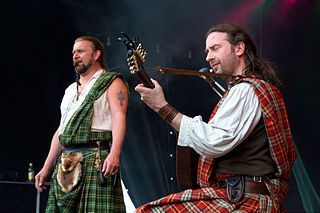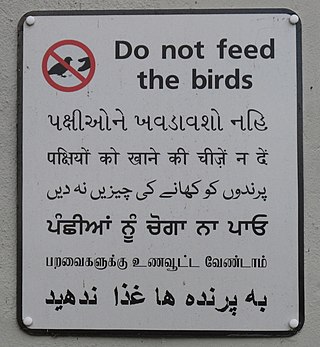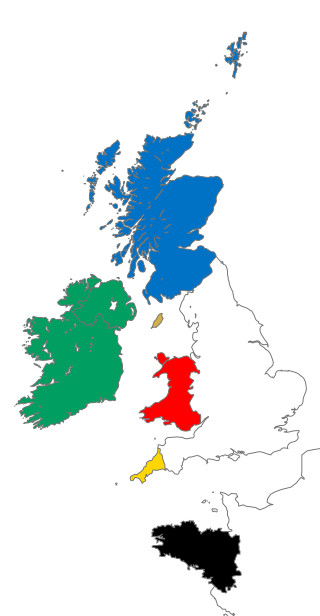
Celtic music is a broad grouping of music genres that evolved out of the folk music traditions of the Celtic people of Northwestern Europe. It refers to both orally-transmitted traditional music and recorded music and the styles vary considerably to include everything from traditional music to a wide range of hybrids.

The Celtic languages are a group of related languages descended from Proto-Celtic. They form a branch of the Indo-European language family. The term "Celtic" was first used to describe this language group by Edward Lhuyd in 1707, following Paul-Yves Pezron, who made the explicit link between the Celts described by classical writers and the Welsh and Breton languages.

Welsh is a Celtic language of the Brittonic subgroup that is native to the Welsh people. Welsh is spoken natively in Wales, by some in England, and in Y Wladfa. Historically, it has also been known in English as "British", "Cambrian", "Cambric" and "Cymric".
Celtic, Celtics or Keltic may refer to:
Cornish is the adjective and demonym associated with Cornwall, the most southwesterly part of the United Kingdom. It may refer to:

Wales is a country that is part of the United Kingdom. It is bordered by England to the east, the Irish Sea to the north and west, the Celtic Sea to the south west and the Bristol Channel to the south. It had a population in 2021 of 3,107,500 and has a total area of 20,779 km2 (8,023 sq mi). Wales has over 1,680 miles (2,700 km) of coastline and is largely mountainous with its higher peaks in the north and central areas, including Snowdon, its highest summit. The country lies within the north temperate zone and has a changeable, maritime climate. The capital and largest city is Cardiff.

In Celtic cultures, a bard is a professional story teller, verse-maker, music composer, oral historian and genealogist, employed by a patron to commemorate one or more of the patron's ancestors and to praise the patron's own activities.

The Matter of Britain is the body of medieval literature and legendary material associated with Great Britain and Brittany and the legendary kings and heroes associated with it, particularly King Arthur. It was one of the three great Western story cycles recalled repeatedly in medieval literature, together with the Matter of France, which concerned the legends of Charlemagne, and the Matter of Rome, which included material derived from or inspired by classical mythology.
Cumbric was a variety of the Common Brittonic language spoken during the Early Middle Ages in the Hen Ogledd or "Old North" in what is now the counties of Westmorland, Cumberland, northern Lancashire in Northern England and the southern Scottish Lowlands, alongside the Kingdom of Elmet in modern day Yorkshire. It was closely related to Old Welsh and the other Brittonic languages. Place name evidence suggests Cumbric may also have been spoken as far south as Pendle and the Yorkshire Dales. The prevailing view is that it became extinct in the 12th century, after the incorporation of the semi-independent Kingdom of Strathclyde into the Kingdom of Scotland.

English, in various dialects, is the most widely spoken language of the United Kingdom, but a number of regional languages are also spoken. These are Scots and Ulster Scots and the Celtic languages, Irish, Scottish Gaelic, Welsh and, as a revived language with few speakers, Cornish. British Sign Language is also used. There are also many languages spoken by immigrants who arrived recently to the United Kingdom, mainly within inner city areas; these languages are mainly from continental Europe and South Asia.
Anglicisation is a form of cultural assimilation whereby something non-English becomes assimilated into, influenced by or dominated by Englishness or Britishness. It can be socio-cultural, where a non-English person, people or place adopt(s) the English language or English customs; institutional, where institutions are modified to resemble or replaced with the institutions of England or the United Kingdom; or linguistic, where a foreign term or name is altered to become easier to say in English. It can also refer to the influence of English culture and business on other countries outside England or the United Kingdom, including media, cuisine, popular culture, technology, business practices, laws, or political systems.
Anglo-Celtic people are descended primarily from British and Irish people. The concept is mainly relevant outside of Great Britain and Ireland, particularly in Australia, but is also used in Canada, the United States, New Zealand and South Africa, where a significant diaspora is located.
The Celtic League is a pan-Celtic organisation, founded in 1961, that aims to promote modern Celtic identity and culture in Ireland, Scotland, Wales, Brittany, Cornwall and the Isle of Man – referred to as the Celtic nations; it places particular emphasis on promoting the Celtic languages of those nations. It also advocates further self-governance in the Celtic nations and ultimately for each nation to be an independent state in its own right. The Celtic League is an accredited NGO with roster consultative status to the United Nations Economic and Social Council (EcoSoc).

The modern Celts are a related group of ethnicities who share similar Celtic languages, cultures and artistic histories, and who live in or descend from one of the regions on the western extremities of Europe populated by the Celts.

Pan-Celticism, also known as Celticism or Celtic nationalism is a political, social and cultural movement advocating solidarity and cooperation between Celtic nations and the modern Celts in Northwestern Europe. Some pan-Celtic organisations advocate the Celtic nations seceding from the United Kingdom and France and forming their own separate federal state together, while others simply advocate very close cooperation between independent sovereign Celtic nations, in the form of Breton nationalism, Cornish nationalism, Irish nationalism, Manx nationalism, Scottish nationalism, and Welsh nationalism.

The Celtic nations are a cultural area and collection of geographical regions in Northwestern Europe where the Celtic languages and cultural traits have survived. The term nation is used in its original sense to mean a people who share a common identity and culture and are identified with a traditional territory.

Fixed surnames were adopted in Wales from the 15th century onwards. Until then, the Welsh had a patronymic naming system.
Celtic folklore may refer to:
Welsh is a surname from the Old English language given to the Celtic Britons. The surname can also be the result of anglicization of the German cognate Welsch. A popular surname in Scotland.






